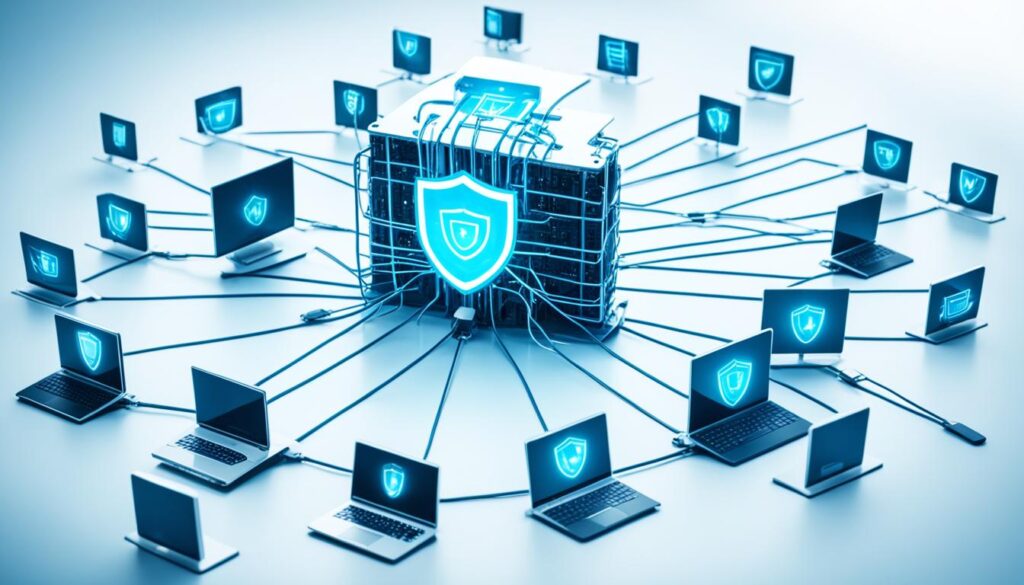Is your business prepared for the era of digital transformation? As technology continues to advance at a rapid pace, organizations in the Philippines are having to adapt quickly or risk being left behind. Digital transformation involves more than just implementing new technologies; it requires a comprehensive integration of digital strategies across all aspects of your business. From leveraging technology trends to driving innovation and disrupting traditional industries, digital transformation is the key to unlocking new opportunities and staying ahead of the competition.

In this article, we will explore the imperative shift to digital in the Philippines, the case study of industry-wide digital adoption, and the impact of digital solutions on Filipino enterprises. We will delve into the strategies and best practices that successful businesses are employing to navigate the digital landscape and thrive in the digital age.
Key Takeaways:
- Understand the significance of digital transformation in the Philippines
- Explore the case study of industry-wide digital adoption
- Discover how digital solutions are reshaping Filipino enterprises
- Learn about the push for digital literacy and connectivity
- Uncover the emerging technologies driving change in the Philippines
The Imperative Shift to Digital in the Philippine Economy
The Philippine economy is currently undergoing a significant shift towards digitalization. This transformation is being driven by the rapid advancement of technology and its impact on various industries. Digital transformation has become an imperative for businesses in the Philippines to stay competitive and relevant in today’s digital landscape.
Revolutionizing Business through Technology
Technology is revolutionizing the way businesses operate in the Philippines. Organizations are adopting digital tools and solutions to streamline processes, improve efficiency, and enhance customer experiences. Through the adoption of digital technologies, companies can automate manual tasks, optimize operations, and drive innovation.
Disrupting Conventional Business Models
The integration of technology is not only revolutionizing operational processes but also disrupting conventional business models in the Philippines. Traditional industries are being challenged to redefine their strategies and adapt to the digital age. Companies that embrace digital transformation can gain a competitive edge by offering innovative products and services that meet the changing needs of customers.
By embracing digital transformation, businesses in the Philippines can unlock new growth opportunities, expand their market reach, and achieve sustainable success. The imperative shift to digital is reshaping the Philippine economy, positioning it as a thriving hub of digital innovation and entrepreneurship.
Philippines: A Case Study of Industry-Wide Digital Adoption
The Philippines serves as a compelling case study for industry-wide digital adoption. Various sectors, including manufacturing, finance, healthcare, and retail, have embraced digital transformation to enhance their operations and services. In a country known for its rapid digital advancement, the adoption of technology has brought forth numerous benefits and opportunities.

In manufacturing, digital solutions have streamlined production processes, improved efficiency, and enabled predictive maintenance, reducing downtime and costs. The finance sector has seen the rise of digital banking and payment systems, enhancing financial inclusivity and convenience for customers. In healthcare, technology implementation has facilitated telemedicine, remote patient monitoring, and digitized medical records, resulting in improved access to quality healthcare services. Retailers have harnessed e-commerce platforms and data analytics to personalize customer experiences, optimize inventory management, and expand market reach.
While the benefits of digital adoption are substantial, each sector faces its own unique challenges in implementing technology solutions. For manufacturing, the integration of legacy systems and resistance to change pose initial hurdles. The finance industry encounters regulatory complexities and security concerns, requiring robust cybersecurity measures to safeguard customer data. Healthcare must address interoperability issues and ensure patient privacy in a digital ecosystem. In retail, adapting to fast-changing consumer behavior and intense market competition remains a challenge.
| Sector | Challenges | Technology Implementation |
|---|---|---|
| Manufacturing | Integration of legacy systems, resistance to change | Streamlined production processes, predictive maintenance |
| Finance | Regulatory complexities, security concerns | Digital banking, payment systems |
| Healthcare | Interoperability, patient privacy | Telemedicine, remote patient monitoring, digitized medical records |
| Retail | Changing consumer behavior, market competition | E-commerce platforms, data analytics |
“Overcoming these challenges requires a comprehensive approach that combines technological innovation, organizational change, and stakeholder collaboration.”
The Philippine case study illustrates the transformative impact of digital solutions across industries. It highlights the importance of sector-specific strategies in navigating challenges and harnessing the full potential of digital transformation. By embracing technology-driven solutions, Philippine businesses are positioning themselves for future growth, innovation, and resilience in an increasingly digital world.
How Digital Solutions are Reshaping Filipino Enterprises
Digital solutions are revolutionizing the way Filipino enterprises operate, driving innovation and transforming various industries. One notable area where digital solutions have made a significant impact is in enhancing service delivery through the adoption of mobile banking and e-wallets.
Mobile banking and e-wallets have revolutionized the financial landscape in the Philippines, particularly in remote areas with limited access to traditional banking infrastructure. These digital solutions have provided convenient and secure alternatives for individuals and businesses to perform financial transactions, including payments, transfers, and investments.
Through the integration of technology, mobile banking and e-wallets have enabled Filipinos to manage their finances efficiently and access banking services anytime, anywhere, using their mobile devices. This has eliminated the need for physical branches and extended financial services to the unbanked or underserved populations.
Furthermore, the Business Process Outsourcing (BPO) industry has played a pivotal role in the digital transformation journey of Filipino enterprises. BPO companies have leveraged digital solutions such as AI-driven chatbots and advanced analytics to enhance efficiency, streamline processes, and deliver high-quality services.
By adopting technology integration, the BPO industry has been able to automate repetitive tasks, improve response times, and provide personalized customer experiences. These digital solutions have not only increased the productivity and profitability of BPO companies but also contributed to the overall growth and competitiveness of Filipino enterprises.
Enhancing Service Delivery with Mobile Banking and E-Wallets
Mobile banking and e-wallets have transformed the way financial services are delivered, offering a wide range of benefits such as:
- Convenience: Users can perform banking transactions anytime, anywhere, without the need to visit physical branches.
- Accessibility: Mobile banking and e-wallets provide access to financial services for individuals in remote or underserved areas.
- Security: Robust security measures and encryption protocols ensure the safety of financial transactions and personal information.
- Speed: Instantaneous transactions allow for quick and efficient fund transfers, payments, and remittances.
- Cost-effectiveness: Digital transactions often have lower fees compared to traditional banking methods.
The Role of BPO in the Digital Transformation Journey
The Business Process Outsourcing (BPO) industry has embraced digital solutions to drive operational excellence and improve customer experiences. Some key contributions of the BPO industry in the digital transformation journey include:
- Efficiency: Automation of repetitive tasks has increased operational efficiency and reduced human error.
- Advanced Analytics: Utilizing data analytics has enabled BPO companies to gain valuable insights and make data-driven decisions.
- AI-driven Chatbots: AI-powered chatbots have enhanced customer support by providing real-time assistance, resolving queries, and offering personalized interactions.
- Scalability: Digital solutions have facilitated the scalability of BPO operations, allowing companies to handle increased volumes without compromising service quality.
- Cost Savings: By adopting digital solutions, BPO companies have been able to streamline processes and reduce operational costs.
Overall, digital solutions are reshaping Filipino enterprises by revolutionizing service delivery through mobile banking and e-wallets and leveraging technology in the BPO industry. These advancements not only enhance efficiency and customer experiences but also contribute to the growth and competitiveness of Filipino businesses in the digital era.
Continue reading as we explore the push for digital literacy and connectivity in the Philippines in Section 5.
Philippines’ Push for Digital Literacy and Connectivity
The Philippines is actively pushing for digital literacy and connectivity to ensure that all individuals have the skills and access to technology necessary to thrive in the digital age. Recognizing the transformative power of technology, the government and various organizations have implemented educational initiatives and infrastructure development projects to bridge the digital divide.
In order to promote digital literacy, the government has launched programs aimed at equipping Filipinos with the essential digital skills needed to engage in the digital economy. These initiatives include training workshops, online courses, and partnerships with educational institutions to integrate digital literacy into the curriculum. By providing individuals with the knowledge and skills to navigate the digital landscape, the Philippines is empowering its citizens to fully participate in the digital era.
Improving connectivity is also a priority for the Philippines. The government has invested in infrastructure development projects to expand broadband access and improve internet connectivity, particularly in underserved areas. By ensuring that all regions have access to fast and reliable internet connections, the Philippines is enabling greater participation in the digital economy and bridging the digital divide.
“Digital knowledge is the key to unlocking new opportunities and staying ahead of the curve.” – Nicky Verd

To support the push for digital literacy and connectivity, private sector organizations have also launched initiatives. Tech companies are partnering with educational institutions to provide resources and training programs, while telecommunication companies are investing in infrastructure to expand coverage and improve connectivity in remote areas.
The combined efforts of the government and the private sector are aimed at creating a digitally literate and connected society in the Philippines. This focus on digital literacy and connectivity will not only empower individuals to take advantage of opportunities in the digital economy but also contribute to the overall growth and development of the nation.
| Initiatives for Digital Literacy | Initiatives for Connectivity |
|---|---|
|
|
Emerging Technologies Catalyzing Change in the Philippines
Emerging technologies are driving significant change in the Philippines and revolutionizing industries across the country. With the integration of artificial intelligence (AI) and the Internet of Things (IoT) within industry frameworks, organizations are experiencing enhanced productivity, efficiency, and innovation. Additionally, the implementation of data analytics is fostering a culture of data-driven decision-making and unlocking valuable insights.
In the Philippines, the adoption of emerging technologies is accelerating digital transformation and fueling innovation in various sectors. By leveraging AI integration, organizations are harnessing the power of intelligent systems to automate processes, provide personalized experiences, and optimize performance. The IoT implementation allows for seamless connectivity and communication between devices, enabling real-time monitoring, predictive maintenance, and improved resource management.
Data analytics, on the other hand, is playing a crucial role in transforming businesses with actionable insights derived from vast amounts of data. Through advanced analytics techniques, organizations can uncover patterns, trends, and correlations to make informed decisions and gain a competitive edge. Data-driven decision-making is driving innovation and enabling organizations to identify new opportunities, streamline operations, and enhance customer experiences.
The integration of AI and IoT, along with the implementation of data analytics, is propelling the Philippines forward on its digital transformation journey. These emerging technologies are reshaping industries, empowering organizations to be more agile, efficient, and innovative in today’s fast-paced digital landscape.
Digital Transformation Philippines: A Strategic National Initiative
Government-Led Projects and Goals
Digital transformation in the Philippines is not just a business-driven initiative; it is a strategic national goal. The government recognizes the importance of embracing digitalization to drive economic growth, improve public services, and enhance overall citizen well-being. To achieve these objectives, several government-led projects and initiatives have been implemented to propel digital transformation across sectors.
One of the key projects is the National Digital Transformation Initiative, which aims to create a roadmap for the country’s digital transformation journey. The initiative involves collaboration among government agencies, industry stakeholders, and the academia to identify strategic goals and action plans.
Furthermore, the government has prioritized the development of digital infrastructure to ensure reliable connectivity and accessibility throughout the country. Initiatives like the National Broadband Program and the Free Wi-Fi for All program have been launched to provide affordable and widespread internet access to both urban and rural areas.
Private Sector Responding with Innovative Digital Strategies
The private sector in the Philippines has also been actively responding to the national digital transformation initiative by implementing innovative digital strategies. Companies across various industries are leveraging technology to drive operational efficiency, improve customer experience, and foster innovation.
In the banking sector, for example, traditional banks are embracing digital transformation by offering mobile banking services and introducing e-wallet platforms to provide convenient and secure financial transactions for their customers. Retail companies are adopting e-commerce platforms to expand their reach and tap into the growing online market.
The private sector’s engagement in digital transformation is not limited to large corporations. Small and medium enterprises (SMEs) are also actively participating in the digital revolution. The government has launched programs and initiatives to support SMEs in their digital transformation journey, providing them with access to training, funding, and technological resources.

The image above illustrates the collaboration between the public and private sectors in driving digital transformation in the Philippines.
In conclusion, the digital transformation in the Philippines is a strategic national initiative that involves both the government and the private sector. The government’s projects and goals aim to create a digital roadmap and develop the necessary digital infrastructure to support the country’s digital transformation journey. The private sector’s innovative digital strategies contribute to driving operational efficiency and fostering innovation across industries. The collaboration between the public and private sectors is essential in propelling the Philippines towards a digitally-enabled future.
The Philippine Government’s Role in Boosting Digital Infrastructure
The Philippine government plays a crucial role in boosting digital infrastructure to support the country’s digital transformation journey. Recognizing the significance of a robust digital infrastructure in driving economic growth and fostering innovation, the government has launched several initiatives to improve connectivity, expand broadband access, and enhance digital infrastructure development.
“Connectivity, which includes access to data and information, is now classified as a right, just like food, clothing, shelter and health services,” says Secretary of the Department of Information and Communications Technology, Gregorio B. Honasan II.
One of the key government initiatives is the National Broadband Program (NBP), which aims to accelerate the deployment of fiber optic cables and wireless technologies across the country. Through this program, the government aims to provide high-speed internet connectivity to underserved areas, bridging the digital divide and ensuring equal access to digital opportunities for all Filipinos.
Additionally, the government has established the Free Wi-Fi for All Program, which aims to provide free internet access in public places such as schools, hospitals, public libraries, and government offices. This initiative promotes digital inclusion and empowers individuals to participate in the digital economy.
Furthermore, the government has taken steps to streamline the permitting process for the construction of cell towers to accelerate the expansion of telecommunications infrastructure. This initiative aims to improve network coverage and capacity, enabling seamless connectivity for businesses and individuals.
In recent years, the government has also implemented policies to attract investments in the telecommunications sector, promoting healthy competition and innovation. These efforts have resulted in increased private sector participation in expanding digital infrastructure and improving the quality of services.
By investing in digital infrastructure and driving initiatives for connectivity and broadband development, the Philippine government is laying a strong foundation for the country’s digital future. These efforts will enable businesses to leverage digital technologies, drive innovation, and contribute to the overall growth of the economy.
Security and Resilience: Safeguarding the Philippines’ Digital Ecosystem
As the Philippines undergoes digital transformation, safeguarding the security and resilience of the digital ecosystem is of paramount importance. Protecting against cyber threats requires the adoption of robust cybersecurity measures. Additionally, regular audits play a critical role in ensuring a safe digital transition, allowing organizations to identify and address security vulnerabilities.
Adopting Robust Cybersecurity Measures
Protecting the Philippines’ digital ecosystem necessitates the implementation of robust cybersecurity measures. These measures help organizations defend against cyber threats, ensuring the safety and privacy of sensitive data. By adopting comprehensive security protocols, such as encryption, firewalls, and multi-factor authentication, businesses can mitigate the risks associated with cyberattacks.
Furthermore, educating employees about cybersecurity best practices and promoting a culture of security awareness is essential in preventing social engineering attacks and enhancing overall resilience.
Regular Audits as Pillar of Safe Digital Transition
Regular audits serve as a pillar of a safe digital transition in the Philippines. Conducting thorough and systematic audits allows organizations to assess their security infrastructure, review existing policies and procedures, and identify potential vulnerabilities.
Audit processes should encompass various aspects, including network security, access controls, data protection, and incident response plans. By conducting regular audits, organizations can proactively identify and address security gaps, ensuring their digital ecosystem remains resilient to evolving threats.

| Cybersecurity Measures | Benefits |
|---|---|
| Encryption | Protection of sensitive data from unauthorized access |
| Firewalls | Prevention of unauthorized access to networks and systems |
| Multi-factor authentication | Enhanced security by requiring multiple verification factors |
| Employee education | Increased awareness of cybersecurity best practices |
By combining robust cybersecurity measures with regular audits, organizations in the Philippines can establish a resilient digital ecosystem that mitigates the risks posed by cyber threats. Prioritizing security and resilience will enable businesses to embrace digital transformation with confidence, ensuring the protection of valuable assets and safeguarding the interests of all stakeholders.
Collaborative Efforts to Support Digital Growth and Innovation
Collaborative efforts between the government and tech companies are playing a vital role in supporting digital growth and innovation in the Philippines. Partnerships are being formed that aim to drive digital initiatives and provide resources to empower small and medium-sized enterprises (SMEs) with digital transformation. These collaborative endeavors are crucial in creating a conducive environment for businesses to harness the power of technology and thrive in the digital landscape.
Partnerships between Government and Tech Companies
The government of the Philippines recognizes the importance of collaboration with tech companies to drive digital transformation at both the national and industry levels. Through strategic partnerships, the government and tech companies are working hand in hand to develop innovative solutions, foster knowledge exchange, and leverage each other’s expertise. These partnerships enable the government to tap into the industry’s best practices while providing tech companies with valuable insights into the specific needs and challenges faced by the country.
To facilitate effective collaboration, the government is establishing platforms where government agencies and tech companies can work together to address common goals. These platforms serve as a space for dialogue, coordination, and the exchange of ideas, paving the way for impactful initiatives that drive digital growth and innovation across industries.
Empowering SMEs with Digital Transformation Resources
Small and medium-sized enterprises (SMEs) play a critical role in the Philippine economy. Recognizing their potential and the challenges they face in adopting digital transformation, collaborative efforts are being made to empower SMEs with the necessary resources and support.
The government, in partnership with tech companies and industry associations, is implementing initiatives that provide SMEs with access to digital resources, training programs, and mentoring opportunities. These initiatives aim to bridge the digital divide by equipping SMEs with the knowledge and tools needed to embrace digital technologies, enhance their competitiveness, and expand their market reach.
In addition to government-led programs, tech companies are also playing a crucial role in empowering SMEs. They are offering specialized digital transformation solutions tailored to the needs and budget constraints of SMEs. Through these initiatives, SMEs can leverage digital resources and technologies to streamline their operations, improve their customer engagement, and drive business growth.
Through collaborative efforts between the government and tech companies, the Philippines is creating an ecosystem that fosters digital growth and innovation. These partnerships, driven by the shared goal of supporting digital transformation, are empowering SMEs and enabling them to thrive in the digital era. By harnessing the power of collaborative initiatives and digital resources, the country is poised to unlock new opportunities and drive sustainable economic development.
From Mobile Tech Adoption to a High-Tech Nation
The adoption of mobile technology has significantly impacted the Philippines, transforming the way people live and conduct business. The surge of mobile applications has revolutionized daily life and commerce, breaking barriers to economic development and propelling the country towards becoming a high-tech nation.
The Surge of Mobile Applications Impacting Daily Life and Commerce
The proliferation of mobile applications has had a profound impact on the daily lives of Filipinos. From communication to entertainment, mobile apps have become an integral part of their routines. Social media platforms, messaging apps, and productivity tools have made it easier for people to connect with others, stay updated with news and trends, and manage their personal and professional lives.
Moreover, mobile applications have revolutionized commerce in the Philippines. E-commerce platforms and food delivery apps have transformed the way people shop and order food. Online banking and payment apps have provided convenience and accessibility, enabling secure and seamless transactions. The surge of mobile applications has opened up new opportunities for businesses, entrepreneurs, and consumers, fostering economic growth and transforming traditional industries.
Breaking Barriers to Economic Development
Mobile tech adoption has played a crucial role in breaking barriers to economic development in the Philippines. With over 173 million mobile subscriptions in the country, mobile devices have become the primary access point to the digital world for many Filipinos.
This widespread adoption of mobile technology has bridged the digital divide, connecting people to vital services and information. It has created opportunities for micro-entrepreneurs and small businesses to reach customers online, expanding their market reach beyond geographical limitations. Mobile technology has empowered individuals, particularly in rural areas, to access education, healthcare, financial services, and employment opportunities.
Furthermore, mobile technology has been an enabler of financial inclusion. Mobile banking and digital payment solutions have provided unbanked and underbanked Filipinos with access to financial services, enabling them to save, send and receive money, and participate in the formal economy. This inclusion has helped drive economic growth and improve the overall well-being of the population.
In conclusion, the adoption of mobile technology and the surge of mobile applications have transformed the Philippines, impacting daily life, revolutionizing commerce, and breaking barriers to economic development. The country is on its way to becoming a high-tech nation, leveraging the power of mobile tech adoption to drive progress, innovation, and inclusivity.
Conclusion
In conclusion, the Philippines is fully embracing digital transformation to drive business growth and foster innovation. The country has experienced an imperative shift to digital in its economy, revolutionizing business practices and disrupting conventional models. The case study of industry-wide digital adoption across various sectors highlights the transformative power of technology.
Through utilizing digital solutions, Filipino enterprises are reshaping their operations, enhancing service delivery, and driving innovation. The emphasis on digital literacy and connectivity is driving change, ensuring that all individuals have the necessary skills and access to technology for the digital age. Additionally, the adoption of emerging technologies like AI and IoT is catalyzing further innovation and driving the country’s digital transformation.
The Philippine government is playing a vital role in boosting digital growth and innovation through its strategic national initiative. Collaborative efforts between the government and private tech companies are also aimed at providing resources and support for SMEs to undergo digital transformation. Furthermore, the surge of mobile tech adoption and the impact of mobile applications have propelled the Philippines towards becoming a high-tech nation.
In conclusion, the Philippines is actively embracing digital transformation to position itself as a leader in technology adoption and drive business growth and innovation. The country’s commitment to digital initiatives, connectivity, and infrastructure development, along with its focus on security and resilience, ensures a thriving digital ecosystem. The Philippines is poised to become a digital powerhouse, harnessing the potential of technology for a prosperous future.
FAQ
What is digital transformation?
Digital transformation is the comprehensive integration of technology into all aspects of operations and interactions with customers. It is a necessary step for organizations to thrive in the digital age, enabling them to enhance efficiency, agility, and innovation.
Why is digital transformation important in the Philippines?
Digital transformation is important in the Philippines to ensure businesses stay competitive and relevant in today’s digital landscape. It revolutionizes business practices, challenges traditional models, and drives growth and innovation.
Which sectors in the Philippines have embraced digital transformation?
Various sectors, including manufacturing, finance, healthcare, and retail, have embraced digital transformation in the Philippines to enhance their operations and services.
How are digital solutions reshaping Filipino enterprises?
Digital solutions are reshaping Filipino enterprises by enhancing service delivery, especially through mobile banking and e-wallets, and by driving innovation in industries like the business process outsourcing (BPO) industry.
What initiatives are being implemented to promote digital literacy and improve connectivity in the Philippines?
The Philippine government and various organizations are implementing educational initiatives and infrastructure development projects to bridge the digital divide, promote digital literacy, and improve connectivity across the country.
How are emerging technologies like AI and IoT driving digital transformation in the Philippines?
Emerging technologies like AI and IoT are playing a crucial role in driving digital transformation in the Philippines by revolutionizing industries through their integration within frameworks, fostering innovation through data analytics, and providing valuable insights for data-driven decision-making.
What is the role of the government and the private sector in driving digital transformation in the Philippines?
The Philippine government has launched various projects and initiatives to drive digital transformation across sectors, while the private sector is actively responding with innovative digital strategies to support the national initiative.
How is the Philippine government boosting digital infrastructure?
The Philippine government has launched initiatives to improve connectivity, expand broadband access, and enhance digital infrastructure development to support the country’s digital transformation journey.
Why is cybersecurity important in the Philippines’ digital ecosystem?
Cybersecurity is essential in the Philippines’ digital ecosystem to protect against cyber threats. Adopting robust cybersecurity measures and conducting regular audits help identify and address security vulnerabilities.
What collaborative efforts are being made to support digital growth and innovation in the Philippines?
Collaborative efforts between the government and tech companies are being made to drive digital initiatives and provide resources to empower small and medium enterprises (SMEs) with digital transformation.
How has mobile technology adoption impacted the Philippines?
Mobile technology adoption has transformed the way people live and conduct business in the Philippines. The surge of mobile applications has revolutionized various industries and broken barriers to economic development.
